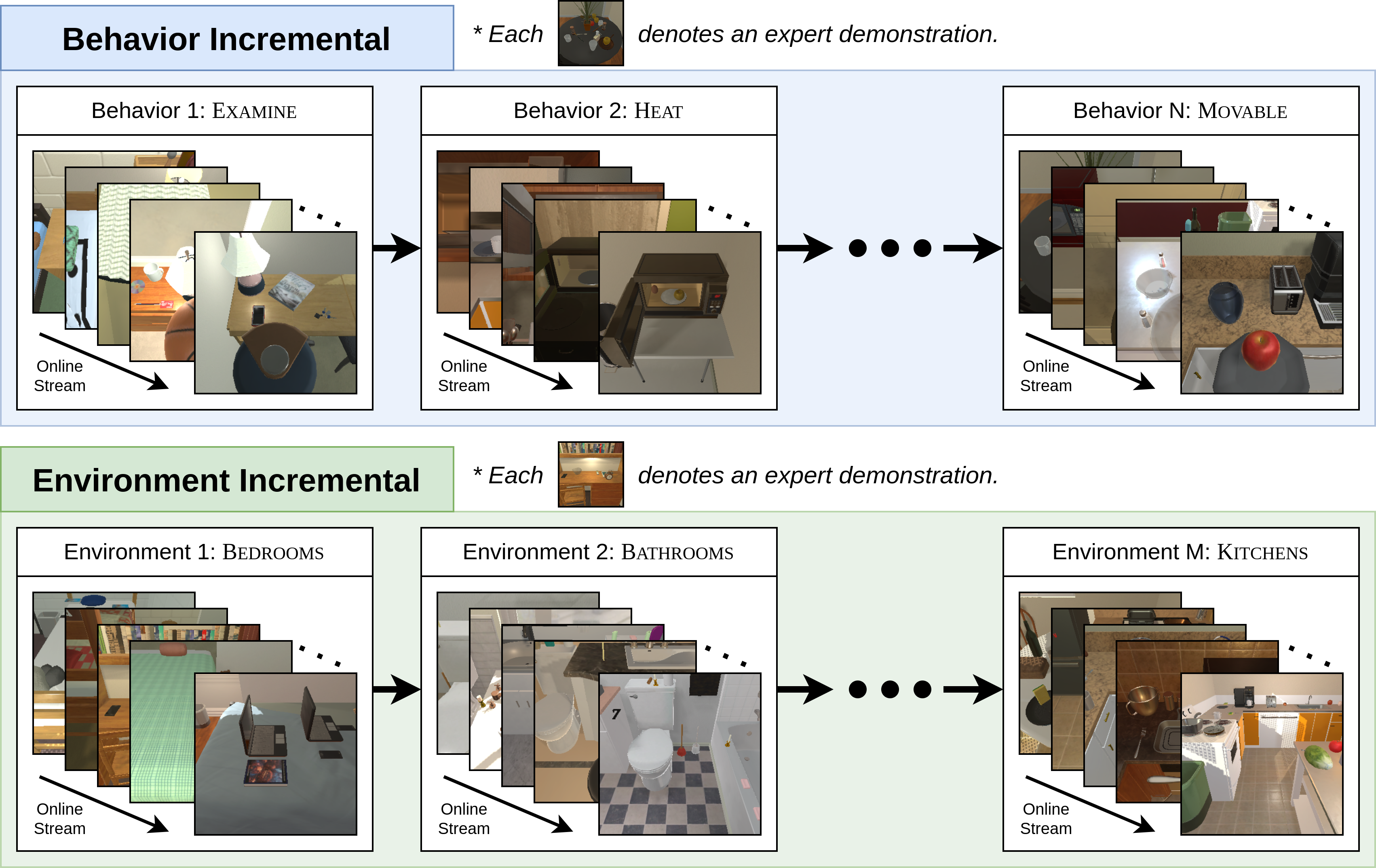Online Continual Learning for Interactive Instruction Following Agents
Byeonghwi Kim*,
Minhyuk Seo*,
Jonghyun Choi
ICLR 2024
CL-ALFRED is a benchmark that continuously learns new types of behaviors and environments for household tasks in ALFRED. CL-ALFRED provides two incremental learning setups: Behavior Incremental Learning (Behavior-IL) to learn novel behaviors (task types) and Environment Incremental Learning (Environment-IL) to learn to complete tasks in novel environments.
We provide the code of the baselines and CAMA. The code is built upon i-Blurry and ABP.
git clone https://github.com/yonseivnl/cl-alfred.git
cd cl-alfred
export ALFRED_ROOT=$(pwd)
Due to different python version usage for training and evaluation, we need a conda env for each training and evaluation.
# Training environment
conda create -n cl-alfred-train python=3.8
conda activate cl-alfred-train
pip install -r requirements_train.txt
# Evaluation environment
conda create -n cl-alfred-eval python=3.6
conda activate cl-alfred-eval
pip install -r requirements_eval.txt
Install PyTorch from the official PyTorch site for both cl-alfred-train and cl-alfred-eval.
conda deactivate
conda activate cl-alfred-train
pip install torch==1.10.0+cu111 torchvision==0.11.0+cu111 torchaudio==0.10.0 -f https://download.pytorch.org/whl/torch_stable.html
conda deactivate
conda activate cl-alfred-eval
pip install torch==1.10.0+cu111 torchvision==0.11.0+cu111 torchaudio==0.10.0 -f https://download.pytorch.org/whl/torch_stable.html
Clone the Hugging Face repository to the path data/json_feat_2.1.0.
This should include numberized annotation files, ResNet-18 features, the vocabulary file, etc.
git clone https://huggingface.co/datasets/byeonghwikim/abp_dataset data/json_feat_2.1.0
Note: It takes quite a large space (~1.6TB).
FAQ: Why does it take so much space?
We provide zip files that contain raw RGB images (and depth & segmentation masks) in the Hugging Face repository, which takes about 250GB in total. With these images, you can extract features yourself with this code. Or, you can build a smaller version of the dataset (e.g., using only egocentric views without surrounding views)! If you are interested in building the egocentric-only version of this dataset, try MOCA for an egocentric-view model!
First, activate the training environment cl-alfred-train.
conda deactivate
conda activate cl-alfred-train
To train a model, run train_seq2seq.py with the hyper-parameters below.
incremental_setup:behavior_il(Behavior-IL) orenvironment_il(Environment-IL)mode: Continual learning methodscama: Confidence-Aware Moving Averagecama_nodc: CAMA without Dynamically Determined Coefficients (CAMA w/o DC)xdereXtended-DER (Boschini et al. IEEE TPAMI'22)der: Dark Experience Replay (Buzzega et al. NeurIPS'20)clib: Continual Learning for i-Blurry (Koh et al. ICLR'22)mir: Maximally Interfered Retrieval (Aljundi et al. NeurIPS'19)er: Experience Replay (Rolnick et al. NeurIPS'19)ewc++: Elastic (Kirkpatrick et al. PNAS'17)
stream_seed: random seed for a behavior/environment sequencedout: a path to save a model in
python models/train/train_seq2seq.py \
--incremental_setup <incremental_setup> \
--mode <mode> \
--stream_seed <stream_seed> \
--dout <path_to_save_weight>
Note: All hyperparameters used for the experiments in the paper are set as default.
For example, if you want train CAMA for the Behavior-IL setup with a stream seed 1 and save the weights in exp/behavior_il/cama/s1, the command may look like below.
python models/train/train_seq2seq.py \
--incremental_setup behavior_il \
--mode cama \
--stream_seed 1 \
--dout exp/behavior_il/cama/s1
First, activate the evaluation environment cl-alfred-eval.
conda deactivate
conda activate cl-alfred-eval
To evaluate a model, run eval_seq2seq.py with the hyper-parameters below.
model_path: the path of a saved modeleval_split:valid_seen(Valid Seen) orvalid_unseen(Valid Unseen)x_display: the number of your display (checkecho $DISPLAYin your command)incremental_setup:behavior_il(Behavior-IL) orenvironment_il(Environment-IL)incremental_type: the current incremental type learned- Behavior-IL:
look_at_obj_in_light,pick_heat_then_place_in_recep,pick_two_obj_and_place,pick_cool_then_place_in_recep,pick_and_place_simple,pick_clean_then_place_in_recep,pick_and_place_with_movable_recep - Environment-IL:
Kitchen,Livingroom,Bedroom,Bathroom
- Behavior-IL:
stream_seed: the seed number of a random stream (1,2,3,4, and5)num_threads: the number of simulators used for evaluationgpu: the usage of GPU during evaluation
python models/eval/eval_seq2seq.py --gpu \
--model_path <model_path> \
--eval_split <eval_split> \
--incremental_setup <incremental_setup> \
--num_threads <num_threads> \
--x_display <x_display> \
--gpu
Note: All hyperparameters used for the experiments in the paper are set as default.
Note: For cpu-only evaluation, remove the option --gpu.
If you want to evaluate our model saved in exp/behavior_il/cama/s1/net_epoch_000002251_look_at_obj_in_light.pth in the seen validation for the current task look_at_obj_in_light of the Behavior-IL setup trained with a random stream sequence 1, you may use the command below.
python models/eval/eval_seq2seq.py \
--model_path exp/behavior_il/cama/s1/net_epoch_000002251_look_at_obj_in_light.pth \
--eval_split valid_seen \
--incremental_setup behavior_il \
--incremental_type look_at_obj_in_light \
--stream_seed 1 \
--num_threads 3 \
--x_display 1 \
--gpu
Note: Choose your available display number x_display.
Note: Adjust your thread number based on your system num_threads.
Trained and tested on:
- GPU - NVIDIA RTX A6000 (48GB)
- CUDA - CUDA 12.0
- CPU - 12th Gen Intel(R) Core(TM) i7-12700K
- RAM - 64GB
- OS - Ubuntu 20.04
GNU GENERAL PUBLIC LICENSE
CL-ALFRED
@inproceedings{kim2024online,
title={Online Continual Learning for Interactive Instruction Following Agents},
author={Kim, Byeonghwi and Seo, Minhyuk and Choi, Jonghyun},
booktitle={ICLR},
year={2024}
}
i-Blurry
@inproceedings{koh2022online,
title={Online Continual Learning on Class Incremental Blurry Task Configuration with Anytime Inference},
author={Koh, Hyunseo and Kim, Dahyun and Ha, Jung-Woo and Choi, Jonghyun},
booktitle={ICLR},
year={2022}
}
ABP
@inproceedings{kim2021agent,
author = {Kim, Byeonghwi and Bhambri, Suvaansh and Singh, Kunal Pratap and Mottaghi, Roozbeh and Choi, Jonghyun},
title = {Agent with the Big Picture: Perceiving Surroundings for Interactive Instruction Following},
booktitle = {Embodied AI Workshop @ CVPR 2021},
year = {2021},
}
ALFRED
@inproceedings{ALFRED20,
title ={{ALFRED: A Benchmark for Interpreting Grounded
Instructions for Everyday Tasks}},
author={Mohit Shridhar and Jesse Thomason and Daniel Gordon and Yonatan Bisk and
Winson Han and Roozbeh Mottaghi and Luke Zettlemoyer and Dieter Fox},
booktitle = {The IEEE Conference on Computer Vision and Pattern Recognition (CVPR)},
year = {2020},
url = {https://arxiv.org/abs/1912.01734}
}
This work was partly supported by the NRF grant (No.2022R1A2C4002300, 15%) and IITP grants (No.2020-0-01361 (10%, Yonsei AI), No.2021-0-01343 (5%, SNU AI), No.2022-0-00077 (10%), No.2022-0-00113 (20%), No.2022-0-00959 (15%), No.2022-0-00871 (15%), No.2021-0-02068 (5%, AI Innov. Hub), No.2022-0-00951 (5%)) funded by the Korea government (MSIT).
